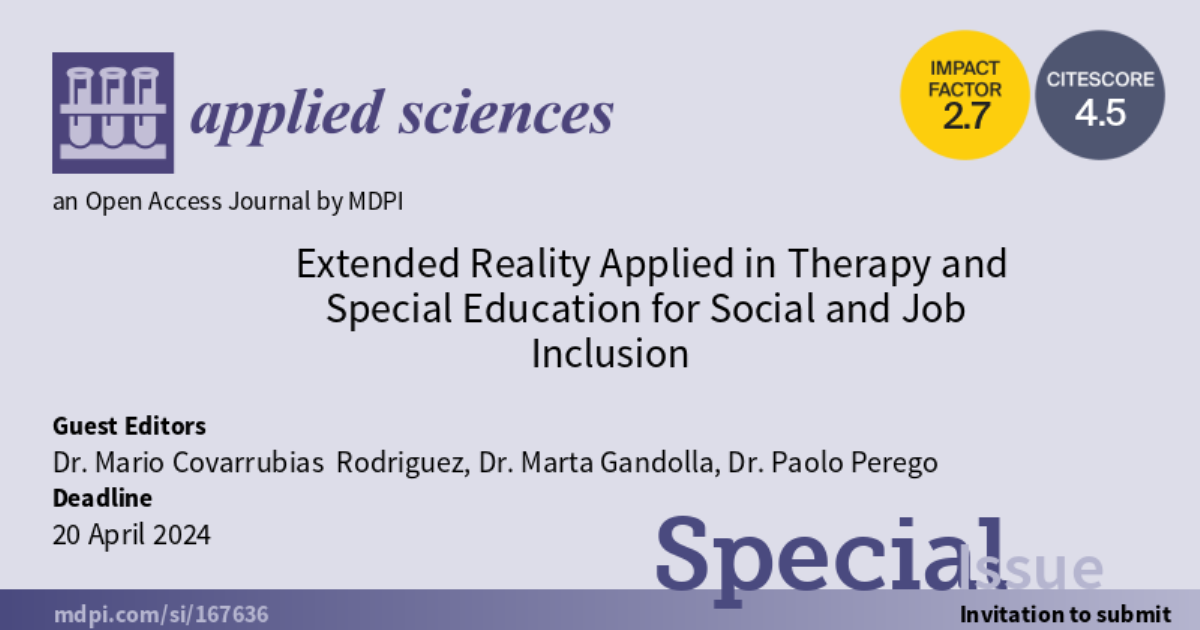Extended Reality Applied in Therapy and Special Education for Social and Job Inclusion
A special issue of Applied Sciences (ISSN 2076-3417). This special issue belongs to the section "Computing and Artificial Intelligence".
Deadline for manuscript submissions: closed (20 April 2024) | Viewed by 263

Special Issue Editors
Interests: virtual reality; augmented reality; multimodal devices; special education; social and job inclusion
Interests: human–machine interfaces; soft robotic wearable devices; robotic exoskeleton; user-centred assistive systems
Interests: wearables; human–computer interaction; UX design rehabilitation; tele-medicine; mobile health
Special Issues, Collections and Topics in MDPI journals
Special Issue Information
Dear Colleagues,
Augmented Reality and Virtual Reality are transforming the way we learn, thus making learning processes more interactive, accessible, collaborative, and funny too. Nowadays, there is an ever-growing selection of Virtual Reality and Augmented Reality applications with a specific focus on accessibility, which allows them to be utilized for special educational needs. Teachers and parents must explore several options to determine the most appropriate apps for their special learners.
The main goal of this Special Session is to shed light on this interesting field by hosting papers focusing on the contemporary research in this area. With this in mind, we propose the following questions:
- How is extended reality transforming Special Education?
- How can extended reality be used to promote inclusive education and a new, more inclusive way to learn?
- How is it possible to use VR and AR to promote training for people with disabilities to improve their competencies in a way that is useful not only in the classroom but also at work and in society in general?
These questions will guide participants to reflect on the possibility of promoting a "technology for humans" that could become a valuable tool for upholding social equity.
Dr. Mario Covarrubias Rodriguez
Dr. Marta Gandolla
Dr. Paolo Perego
Guest Editors
Manuscript Submission Information
Manuscripts should be submitted online at www.mdpi.com by registering and logging in to this website. Once you are registered, click here to go to the submission form. Manuscripts can be submitted until the deadline. All submissions that pass pre-check are peer-reviewed. Accepted papers will be published continuously in the journal (as soon as accepted) and will be listed together on the special issue website. Research articles, review articles as well as short communications are invited. For planned papers, a title and short abstract (about 100 words) can be sent to the Editorial Office for announcement on this website.
Submitted manuscripts should not have been published previously, nor be under consideration for publication elsewhere (except conference proceedings papers). All manuscripts are thoroughly refereed through a single-blind peer-review process. A guide for authors and other relevant information for submission of manuscripts is available on the Instructions for Authors page. Applied Sciences is an international peer-reviewed open access semimonthly journal published by MDPI.
Please visit the Instructions for Authors page before submitting a manuscript. The Article Processing Charge (APC) for publication in this open access journal is 2400 CHF (Swiss Francs). Submitted papers should be well formatted and use good English. Authors may use MDPI's English editing service prior to publication or during author revisions.
Keywords
- extended reality
- social inclusion
- job inclusion
- special education
- VR training
- AR training






